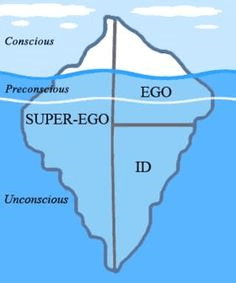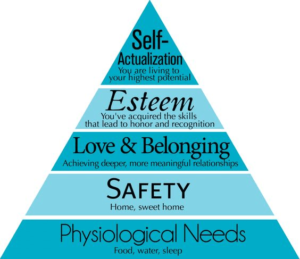Most of the people find travelling relaxing; it’s their getaway from the stress of normal life or just willingness to explore something new, something they haven’t experienced before. We do it, because we like it, that’s clear. However, why does it happen? Why is getting out of one’s comfort zone bring so much joy and energy?
Hey everyone, I’m Weronika and I’m the new Premium Blogger of Why Not 3! The topic of travelling is amazing to me. Originally from Poland, moved to the Netherlands for studies, currently working for pm2am – a Student Travel Company in Germany. Let’s be honest. Travelling is my passion, I’m totally hyped about this topic and I enjoy it to the fullest. But why?

I found the answer in a research paper carried out with the help of over two hundred students from different German universities.
It’s scientifically proven that the great getaway travel actually influences and changes our personality. Julia Zimmermann and Franz Neyer from Jena University in Germany established this fact in the fascinating paper “Do We Become a Different Person When Hitting the Road? Personality Development of Sojourners’” issued in Journal of Personality and Social Psychology[1]. Their aim was to research the impact of international experience on personality and examine the connection between life events and personality development.
They did so by carrying out an experiment on the university students. There were three groups of both short-term and long-term travellers along with control students who stayed at their current place of residence. The assessment based on Big Five Personality Traits: Openness to Experience, Conscientiousness, Extraversion, Agreeableness and Neuroticism (which is also referred as Emotional Stability).
Personality
Let’s start with the explanation of personality itself. According to Cambridge Dictionary personality is the type of person you are, shown by the way you behave, feel, and think.

The Cambridge definition is quite simple and understandable. Seems self-evident.
The Ancient Times of Personality
It took much more time than expected to reach this explanation, though. The history of the personality research already dates back to ancient Greece and can be divided into several parts.
Hippocrates came up with two poles on which temperament could differ: moist vs. dry and hot vs. cold. The combinations within – hot&moist, hot&dry, cold&moist, cold&dry – were called humours that had impact on both personality peculiarities and health issues.
Later on, Aristotle (basing on Plato’s findings) explained personality by dividing its types into iconic (or artistic), pistic (common sense), noetic (intuitive) and dianoetic (logic).
The Curious Case of Phineas Gage
But it was Phineas Gage who was the person that (totally accidentally) proved the connection between personality and physical brain. This railway construction worker suffered a horrible accident when premature detonation of explosive powder impaired his brain. There were only two visible injuries. One where the iron rod went into his cheek and the other was the blindness in the left eye. Nevertheless, the personality of Gage changed dramatically. His friends recorded that he was not able to keep appointments anymore, showed little compassion or respect to others and, consequently, lost the social inhibitions. This was an interesting discovery for psychology.
The Id, Ego and Superego of Freud
Then comes Sigmund Freud – the father of psychoanalysis -– where in one of his theories he divided the human mind into three parts: the id, the ego and the superego.

The id is the instinctual and primitive part of the mind that aims for survival at all costs. The superego performs as a moral conscience representing humans’ higher qualities. The ego is the connector between the desires of the id and moral framework of superego.
The theory of Freud supports the fact that the behaviour of people, their thoughts, motivations and attitudes are, in some cases, unconscious.
Abraham Maslow and his Hierarchy of Needs
Abraham Maslow reverted to the theory of Freud proving that some of the personality drivers are led by the unconscious mind. He organized the set of needs each human has into hierarchy, known as Maslow’s pyramid.

The Big Five Theory
What we base on in this article is the Big Five Theory built off on the previous personality findings.

There are five primary factors of personality:
- Extraversion
- Openness to Experience
- Neuroticism (which is also referred as Emotional Stability)
- Agreeableness
- Conscientiousness
Let’s slice and dice these traits and the outcome of the research.
Extraversion
People with the traits connected to extraversion: sociability, energy and social confidence seek out for interaction with people. Except for being known as “the life of the party” they are more likely to act rather than overthink.
There is no surprise that people higher in extraversion choose to spend their weekend getaway on travelling and interacting with people. However, what is amazing in travelling is the fact that the introverts tend to bring themselves out of their peaceful and cozy shell, challenge to communicate and get to know other cultures, beliefs and ideas. With realizing that “Hey, this guy from India is pretty damn cool” engaging into conversation the next time seems not only less scary but also more exciting.
Openness to Experience
Sometimes called imagination or intellect, openness to experience is the measurement of one’s experience and mental life. It entails the willingness to try out new things, think outside the box and it’s connected to your imagination, creativity and preference for variety.
While travelling a person has no other choice but to get oneself out there, interact with people and look for connection. Even during your weekend getaway you will find yourself in a situation that you have to ask for help, for direction or simply would like to have a chat with another person. Go for it, get out of your comfort zone and feel the joy life has to offer.
Neuroticism
Neuroticism entails the emotional stability, general temper and, straightforwardly, the measurement of being comfortable in one’s own skin. In contrast to the previous traits not the high, but low level of neuroticism means that you’re good. The ones who score on the low end of neuroticism are prone to feel more confident, adventurous and less self-doubt.
The neuroticism trait explains how the individual deals with both subtle and dramatic life changes. Even the weekend getaway can expose you to new experiences and put you in unfamiliar situations.
Agreeableness
This trait explains the way people treat others. The ones with high level of agreeableness are usually well liked, very much sensitive to the needs of others as well as sympathetic to the problems of strangers.
Let’s look at agreeableness from the perspective of the traveler. You are on your great getaway travel, in completely different geographic location, surrounded by the culture and language you are most probably not used to. You simply cannot be a douchebag. You depend on the mercy of local person, so be nice!
Conscientiousness
People with this tendency to behave in socially acceptable ways usually work according to the rules, plan effectively and organize themselves efficiently. Most of them are ambitious, persistent and self-disciplined.
The essence of consciousness while being on your great getaway travel is to find a balance between a loose plan and to-do queue. In the end you don’t want to arrive at the airport to catch you flight to St. Petersburg without valid documents nor exhaust yourself with racing from every major and minor landmark the city has to offer.
The Influence of Travelling
After the academic year the tested group of students returned to their homeland. When they underwent the survey and answered the questions, the results were obvious.
The students who spent their semester abroad experienced the rise in their levels of Extraversion and Conscientiousness. Since they were on their own in a totally different place, they had no other choice but to engage themselves in a conversation with other people. As well as, being responsible for finding their own accommodation, filling in documents or planning their budget. It was their responsibility, so they had to become more organized and attentive.
Those who decided to study for the whole academic year improved the score of their Openness to Experience and got to be more curious about the world.
Both groups of students were associated with a decrease in Neuroticism and increase in Agreeableness and Extraversion.
Last but not least, one of the most important influences on the personality change was them gaining new international relationship support.
The Other Side of Great Getaway

Except for gaining new friends, new experiences, new stories, travelling has a few other positive side effects as well.
Travels put one’s life into perspective. After one year spent in a different environment one is no longer anxious or uneasy about the situations that deviate from the daily routine. Life is what it is, and your reaction determines your course and mood. Instead of getting derailed, keep your head up, embrace the obstacles and find a solution that will benefit you in the long run.
Furthermore, travelling enhances your senses. Learning to adjust yourself to the culture you are surrounded by encourages your mind to learn faster, which is an indication of stimulation, and also creativity. Galinsky is a professor at Columbia Business School who carried out numerous studies on the connection between travelling and creativity. According to his research “Foreign experiences increase both cognitive flexibility, depth and integrativeness of thought, the ability to make deep connections between disparate forms”. What it means is that living in another culture affects the psychological processes, which in turn enhances people’s creativity.
Last but not least, the weekend getaway is a perfect adrenalin rush that makes your life exciting. Think about the moment your plane is boarding and you’re setting foot in a new place or grabbing the map of a beautiful city ready to explore its marvels. Those are the moments that make sure you receive the right dose of energy and come back with a completely fresh mind.
The Correlation between Personality and Perfect Destination
Another interesting point is the choice of the getaway destination which tends to be closely connected to the type of personality you represent.
There is a difference between the perfect location for extraverts and introverts. While the first ones tend to go for open and flat regions, the latter prefer to live in mountainous locations.
According to the research of Shige Oishi, University of Virginia psychologist[2], some of the places ”have geography that is more accommodating for some people than for others”.

What is interesting is the fact that it also works the other way around. According to PNAS paper[3] certain personalities are more likely to flourish under certain conditions.
And the researchers didn’t mean different countries or even the cities. The survey was carried out with the help of 56,000 individuals living in London.
The Personalities in London
In the first stage of the study the focus was on psychological characters, residential information and demographic factors.
Further on, this data was used to establish the ratings of life satisfaction and The Big Five Personality Traits: Openness to Experience, Conscientiousness, Extraversion, Agreeableness, Neuroticism in specific neighborhoods of London. Ring any bells?
The outcome showed that different traits were connected to different districts.
High Openness to Experience and low Conscientiousness were associated with Central London, while southwest boroughs were characterized by high levels of Extraversion and Emotional Stability.
In some cases the personality traits were linked to particular urban characteristics. Higher life satisfaction was found in neighborhoods with high income, while neighborhoods with low income and employment rates had higher Openness to Experience.

Of course, when deciding on the place to settle down, one has to take other factors into consideration as well. It is important to be aware of the economic factors such as cost of living or the personal ones like proximity to family and friends and range of possibilities to fill your leisure hours.
But if you’ve always dreamt about living in a cottage house surrounded by the mountain range and wildlife, why would you limit yourself to this concrete jungle filled with smog and blaring traffic jams?
Conclusion
Travelling has become a part of our life.
Not many of us, however, realize how much impact it has on our lives. It is not only about discovering places, cuisine and culture, but also about discovering yourself and influencing your personality.
The travelers tend to be much more open to experience, agreeable and extravert. They draw their creativity from the environment and easily adjust themselves to new situations.
That’s why I wholeheartedly encourage you to get out of your comfort zone, try out something new, something exciting that may change the way you think and help you find a balance in your life.
Then, while settling down, it might be useful to bear in mind your personality and its perfect destination fit.
Cheers,
Why not 3? Work Life Balance for Entrepreneurs
[1] Zimmerman, J. i Neyer, F. (2013). Pub Med. Do we become a different person when hitting the road? Personality development of sojourners.
[2] Oishi, S. (2015). Society for Personality and Social Psychology. Retrieved from Introverts Like Mountains.
[3] Proceedings of the National Academy of Sciences. (2015).






Leave a Reply
Want to join the discussion?Feel free to contribute!